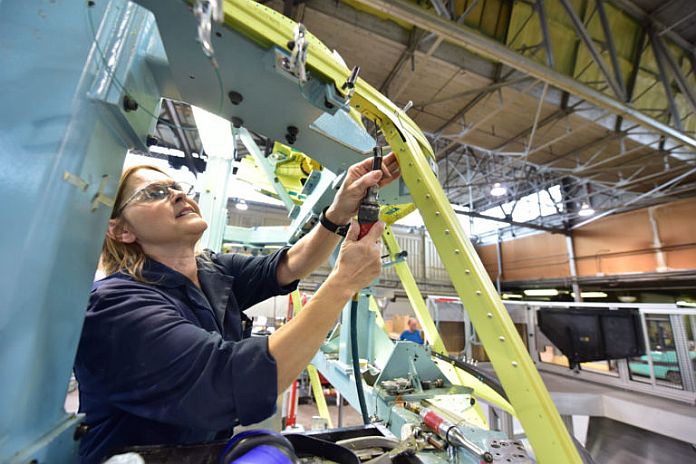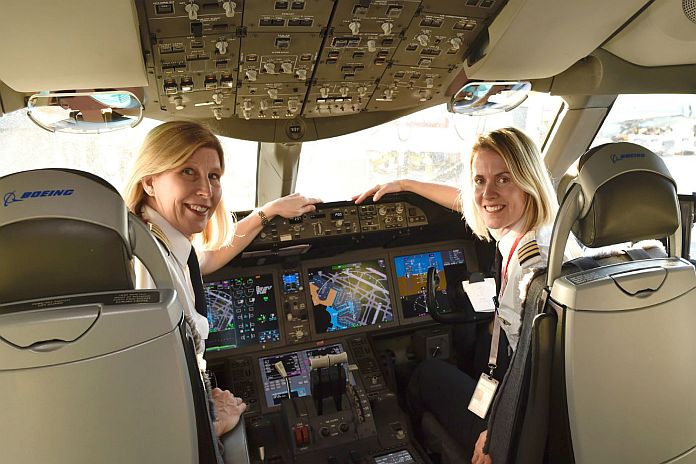Kriya Shortt, senior vice-president of parts and programs at Textron Aviation and member of the FAA Women in Aviation advisory board, recently hosted a conversation with female industry leaders at the 2020 NBAA-VBACE. The discussion centred around the importance of supporting and retaining women in the workforce, and how companies can address the challenges women face.
The panel included Gail Grimmett, chief experience officer at Wheels Up; Sheryl Barden, president and chief executive officer of Aviation Personnel International; Rene Banglesdorf, chief executive officer of Charlie Bravo Aviation; Lindsey Dreiling, executive director of aviation strategy at Kansas State University (KSU); and Emelie Knobloch, talent management representative, K-12 programs at Textron Aviation.
Shortt opened the panel with a look at how world events have impacted the working woman, referencing a survey released by McKinsey and Company, which offers “insight into just how significant the impact of COVID-19 has been on women. According to their research, one in four women in corporate America are contemplating downshifting their careers or leaving the workforce altogether,” said Shortt.
For female mentors who have built their careers advocating for more women in aviation, this is cause for concern.
“Across the broad spectrum, we are going to see a number of women pulled out of the workplace because of this situation,” added Grimmett. “[As well], not being able to walk that balance between being a mom, and providing for their family, and also being a professional.”
Charlie Bravo Aviation’s Banglesdorf said she sees a similar pattern. Still, she is inspired by the “female innovator” trend seen in the business aviation community.
“I’m really hopeful that as women leave the corporate workforce, they begin starting their own businesses, defining their own workspace and their own ability to manage their schedule,” she said.
“We’ve been seeing a trend upward in female entrepreneurship for probably the last 10 or 12 years, and I think this is really going to spur that on.”
While an unscheduled pause may be unavoidable, the panel unanimously agreed that this industry’s passion will persevere.
“It’s a time for deep reflection,” said Dreiling. “[Women] may be leaving one area, but will show up in another area where they’re finding their passion.”
Not all women want to be the pioneers or trailblazers — an honour that can also be seen as a burden.
“I’ve long felt that it can’t just be women advocating for women,” said Shortt. “We need our male allies as well . . . to ease the burden.”

While there’s a need for female pilots and engineers, there is also a need for female administrators and marketing specialists. It’s “an entire industry,” said Barden. [Photo: Mike Reyno ]
In the past, a task’s importance had often outweighed the needs of the person completing it. The panel agreed that 2020 has taught us the importance of the “human factor” – creating workspaces and expectations that serve all.
There’s a need for female administrators, marketing specialists, and HR professionals – not just pilots and engineers. It’s “an entire industry,” said Barden. “It’s easy to think of the obvious . . . the pilots and the mechanics and aerospace engineers who are all very valuable, but as we know, it’s an entire industry.”
Mentors, both male and female, have a significant impact on the types of careers we choose. Going forward, to understand the shortage of women in aviation, success lies in the stories of those who have found their way. How can we build off of them? Learn from them, and utilize them to inspire?
The solution is multifaceted.
“If we could just find this silver bullet, we would have done it by now,” said Shortt. “But it is complex. It may take different practices and different language, and how we’ve done things before will not get us where we want to go. Sometimes it’s as simple as reframing the conversation.
“How do we create this sense of belonging, inclusiveness? What language are we using? Is it inclusive to women? Is it not? We really have to take a critical look at the history of aviation. [. . .] We love our history, but it wasn’t that inclusive of women. Can we reframe some of those practices? [. . .] Reframe some of that language to get us where we want to go — not where we’ve been?”
It’s about correcting the past with eyes steadily focused on the future, finding your voice and advocating for female co-workers. “Take yourself out of your comfort zone,” added Barden, “and if you have a mentor, you don’t just want to hear what you’re doing right. You want to hear what you need to do for the next step.”
– This article written by Natasha McKenty originally appeared on Skies on December 11, 2020.





